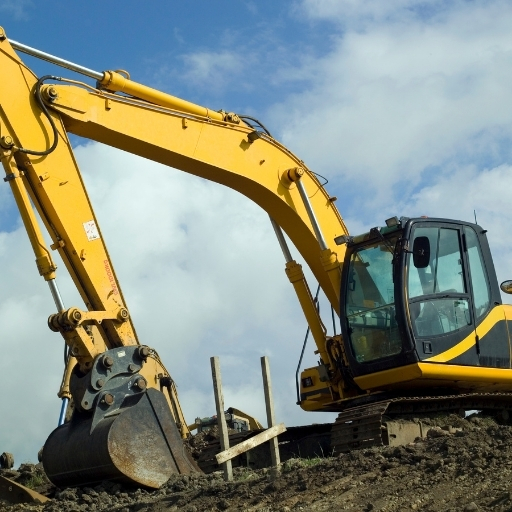Categories
GPS fleet tracking systems are becoming increasingly popular among on-road fleet vehicles. With the ability to increase productivity, reduce fuel costs, and prevent theft, more and more fleet managers are eager and willing to make the investment. However, the idea that a GPS fleet tracking system can have an equally powerful impact on off-road equipment is not as intuitive and well known. Regardless, using telematics equipment and GPS navigation systems with off-road vehicles can yield impressive results for business managers.
Every year, billions of dollars worth of construction equipment is stolen from locations throughout world. In the United States, the National Crime Insurance Bureau estimated that in 2007 more than $1 billion in construction equipment was stolen each year. According to the 10th Annual Construction Equipment Theft Study, a report that provides valuable information on the ongoing issue of equipment theft, 13,452 pieces of equipment were stolen in 2009, 82 percent of which were never recovered. According to the study, construction theft continued to be driven by organized crime rings, with towables (generators, welders and air compressors) being the number one theft target.
In the United Kingdom, according to the 2009 Equipment Theft Report, published by the National Plant & Equipment Register, the most commonly stolen items in that country in 2008 were trailers (911 thefts), excavators(849), site dumpers (244) and telehandlers (202). The biggest increases in thefts were in agricultural tractors (up 149 percent), quad bikes (up 83 percent), forklift trucks (up 67 percent), and portable generators (up 55 percent).
Some fleet managers pay a premium for satellite tracking to ensure their low-cost equipment is not stolen. The cost of the equipment does not justify the premium alone. But the cost of sending a crew to a remote location only to find out they can’t work because necessary equipment like a generator is gone is what justifies the investment.
GPS fleet tracking systems can provide sufficient ROI though theft protection, equipment idling reductions, asset usage monitoring, increased safety, security and much, much more. GPS fleet tracking systems have the potential to increase the efficiency of all fleet units — and prevent accidents or even disasters. Time and time again customer reports are indicating the significant fuels savings and reduced vehicle emissions, making it much easier to justify the investment in telematics equipment.
According to AT&T’s Fleet Manager, Moscatelli, with off-road GPS tracking devices, return on investment (ROI) comes from many areas, including theft prevention, reduction of unnecessary maintenance stops, remote payroll, remote utilization monitoring, actual off-road fuel use data capture for tax purposes, location verification, and more. For example, using a GPS fleet tracking device for geo-fencing (creating an invisible perimeter around a job site to indicate when a machine leaves the area) to improve the ability to find the machine in the field can offer an immediate ROI.
Reducing idling is another major ROI driver. Some off-road, mobile workers still think it’s okay to keep a fleet vehicle idling since there is always a chance it may not start back up or that turning it off and on will cause increased wear and tear. That was fine when fuel was $1 a gallon and the environmental impact was not as apparent, but times have certainly changed. Now, running a vehicle 80 percent of the time when it’s not actually moving is unacceptable from both a financial and an environmental perspective. Reports have shown that customers using GPS fleet tracking systems have reduced off-road idling percentages from 60-80 percent to 2-5 percent.
Another example is Kennecott Copper Mine in Salt Lake City achieved a 1,500 % ROI by using a GPS fleet tracking system to radically reduce idling, remotely shut off vehicles, automate alerts when off-road vehicles were nearby in order to increase efficiency, as well as improve safety with panic alerts and latitude/longitude sent to emergency crews. The GPS fleet tracking system even helped the company to win an environmental sustainability award from the State of Utah for their extreme reduction of greenhouse gases in 2009.
Determining a fleet’s exact requirements to managing off-road equipment and avoiding unnecessary purchases will not only save money spent on unused equipment, but also will ensure the fleet uses the equipment it has. Once a fleet manager knows what data to collect, it’s important to know it will yield results – and whether the purchase investment is justified.
While safety is important for all fleet units, off-road equipment presents higher stakes. On a daily basis, telematics can monitor switches and sensors to interpret and control remote events, such as shutting down a vehicle left idling for too long. But sometimes, remotely turning off an ignition could be the difference between life and death. With large equipment that can do damage in an instant, telematics can do more than benefit the bottom line. Telematics in off-road equipment can help companies avert liability and serious accidents.
In a nutshell, reduced fuel and operating costs, reduced carbon footprint, better equipment management, increased safety and security, and better accountability all provide an immediate return on investment.
Source: Government Fleet

